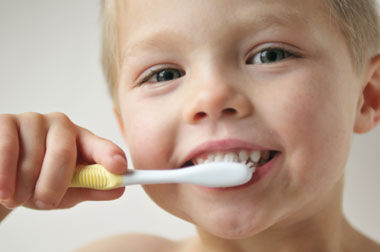
Start Early
Your child’s baby teeth are at risk for decay as soon as they first appear—which is typically around age 6 months. Tooth decay in infants and toddlers is often referred to as Baby Bottle Tooth Decay. It most often occurs in the upper front teeth, but other teeth may also be affected. In some cases, infants and toddlers experience decay so severe that their teeth cannot be saved and need to be removed.
The good news is that tooth decay is preventable! Most children have a full set of 20 primary teeth by the time they are 3-years-old. As your child grows, their jaws also grow, making room for their permanent teeth.
Cleaning Your Child’s Teeth
- Begin cleaning your baby’s mouth during the first few days after birth by wiping the gums with a clean, moist gauze pad or washcloth. As soon as teeth appear, decay can occur.
- When your child’s teeth begin to come in, brush them gently with a child-size toothbrush and water. A baby’s front four teeth usually push through the gums at about 6 months of age, although some children don’t have their first tooth until 12 or 14 months.
- For children older than 2, brush their teeth with a pea-sized amount of fluoride toothpaste. Be sure they spit out the toothpaste. (Ask your child’s dentist or physician if you are considering using fluoride toothpaste before age 2.)
- Until you’re comfortable that your child can brush on his or her own, continue to brush your child’s teeth twice a day with a child-size toothbrush and a pea-sized amount of fluoride toothpaste. When your child has two teeth that touch, you should begin flossing their teeth daily.
First Dental Visit
As soon as your child’s first tooth appears, it’s time to schedule a dental visit. The American Dental Association recommends that the first dental visit take place within six months after the first tooth appears, but no later than a child’s first birthday.
Fluoride
Fluoride is a mineral that occurs naturally in all water sources, including oceans, rivers and lakes. Fluoride is also added to some community tap water, toothpastes and mouth rinses. Infants and toddlers who do not receive an adequate amount of fluoride may be at an increased risk for tooth decay since fluoride helps make tooth enamel more resistant to decay. It also helps repair weakened enamel. Bottled water may not contain fluoride; therefore, children who regularly drink bottled water or unfluoridated tap water may be missing the benefits of fluoride. If you are not sure if your tap water has fluoride, contact your local or state health department or water supplier.
* Information provided by the American Dental Association.
